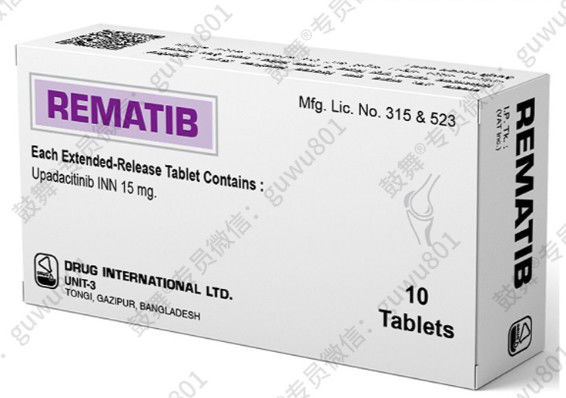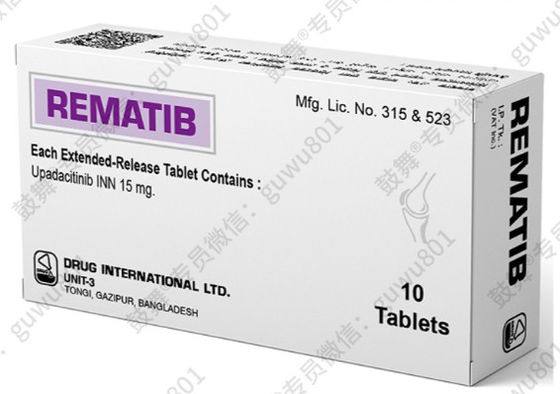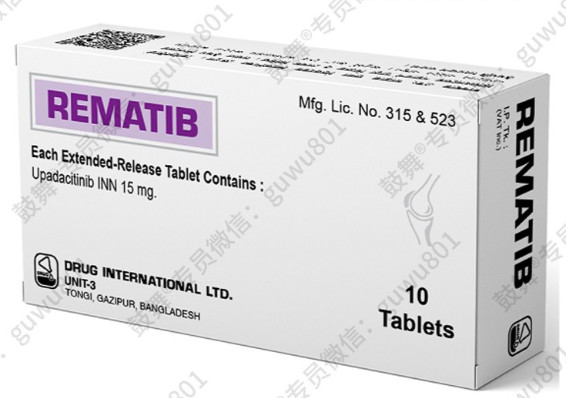【药品名称】
通用名:乌帕替尼缓释片
产品名称:瑞福®(英文:RINVOQ®)
英文名称:Upadacitinib Sustained-release Tablets
Chinese Pinyin: Wupatini Huanshipian
【适应症】
特应性皮炎
本品适用于12岁及以上成人和青少年难治性,中度至重度特应性皮炎患者,对其他全身治疗(如激素或生物制剂)反应不佳,或不适用于上述治疗.
使用限制:不建议将本产品与其他JAK抑制剂,生物免疫调节剂或其他免疫抑制剂同时使用.
类风湿关节炎
该产品适用于对一种或多种 TNF 抑制剂反应不足或不耐受的中度至重度活动性类风湿性关节炎成年患者.
使用限制:不建议将本产品与其他JAK抑制剂,生物DMARD或强效免疫抑制剂(如硫唑嘌呤和环孢菌素)同时使用.
银屑病关节炎
本品适用于对一种或多种改善病情的抗风湿药物 (DMARD) 疗效不佳或不耐受的活动性银屑病关节炎成人患者.本品可与甲氨蝶呤 (MTX) 联合使用.
【乌帕替尼的剂量】
乌帕替尼治疗应由对本品适应症的诊断和治疗有经验的医师开始并在其指导下使用.
特应性皮炎
12岁及以上,体重≥40公斤的儿童和65岁及以下的成人,起始剂量为15毫克,每日一次.如果疗效不佳,可考虑增至30毫克,每日一次.如果30毫克剂量未达到充分疗效,则停用本品.应使用维持疗效所需的最低有效剂量.本品在体重低于40公斤的青少年中的安全性和有效性尚未进行研究.
对于 65 岁及以上的成年人,建议剂量为每天一次 15 毫克.
年龄≥75 岁患者的数据有限.
类风湿关节炎
建议剂量为每天一次 15 毫克.
银屑病关节炎
建议剂量为每天一次 15 毫克.
肾功能损害
特应性皮炎:轻度或中度肾功能不全患者无需调整剂量.关于乌帕替尼用于重度肾功能不全患者的数据有限(参见药代动力学).重度肾功能不全患者应谨慎使用乌帕替尼15毫克/日一次的剂量.不建议重度肾功能不全患者使用乌帕替尼30毫克/日一次的剂量.乌帕替尼尚未在终末期肾病患者中进行研究.
类风湿性关节炎和银屑病关节炎:轻度或中度肾功能不全患者无需调整剂量,重度肾功能不全患者应谨慎使用 15 mg 每日一次的 upadatinib.
肝损害
轻度(Child-Pugh A)或中度(Child-Pugh B)肝功能不全患者无需调整剂量(参见“药代动力学”).重度(Child-Pugh C)肝功能不全患者禁用本品(参见“禁忌症”).
【乌帕替尼的用法】
本产品可与食物同服或单独服用,可在一天中的任何时间服用.本产品应整片吞服,切勿掰开,压碎或咀嚼,以确保服用完整剂量.
开始给药
不建议绝对淋巴细胞计数 (ALC) 低于 500 个/mm3,绝对中性粒细胞计数 (ANC) 低于 1000 个/mm3 或血红蛋白水平低于 8 g/dL 的患者开始治疗.(参见[注意事项] 和 [不良反应]).
暂停给药
如果患者出现严重感染,应暂停使用本产品治疗,直至感染得到控制.
表 1 中描述的实验室异常可能需要停止给药并进行相应的管理.
表1 实验室检查和监测指南
实验室检查指标措施监测指南
绝对中性粒细胞计数(ANC)如果ANC<1000个/mm3,应暂停用药,直至ANC恢复到1000个/mm3或以上,然后才能重新开始用药.评估应在基线时进行,并且不晚于治疗开始后12周进行.此后的评估基于个体患者管理.
绝对淋巴细胞计数(ALC)如果ALC<500个/mm3,应暂停给药,直至ALC恢复到500个/mm3或以上,然后才能重新开始给药.
血红蛋白(Hb)如果Hb<8g/dL,应暂停给药,直至Hb恢复到8g/dL或以上,然后才能重新开始给药.
肝脏氨基转移酶如果怀疑药物引起的肝损伤,应暂停用药.应在基线时和基线后根据常规患者管理进行评估.
血脂:患者应按照国际高脂血症临床指南进行管理.开始治疗后12周进行评估,并根据高脂血症临床指南进行后续监测.
联合局部治疗(用于特应性皮炎):本品可与外用皮质类固醇联用或单独使用.外用钙调神经磷酸酶抑制剂可用于敏感部位,例如面部,颈部,间擦部位和生殖器.
【不良反应】
喉炎,病毒性喉炎,鼻咽炎,口咽疼痛,咽脓肿,咽炎,链球菌性咽炎,咽扁桃体炎,呼吸道感染,呼吸道病毒感染,鼻炎,鼻咽喉炎,鼻窦炎,扁桃体炎,细菌性扁桃体炎,上呼吸道感染,病毒性咽炎,病毒性上呼吸道感染
痤疮和痤疮样皮炎
生殖器疱疹,生殖器单纯疱疹,疱疹样皮炎,眼疱疹,单纯疱疹,鼻疱疹,眼单纯疱疹,疱疹病毒感染,口腔疱疹
立即严重的过敏反应,过敏性休克,血管性水肿,系统性剥脱性皮炎,药物超敏反应,眼睑水肿,面部水肿,超敏反应,眶周肿胀,咽部肿胀,面部肿胀,中毒性皮疹,I型超敏反应,荨麻疹
腹部和上腹部疼痛
带状疱疹和水痘
[孕妇及哺乳期妇女用药]
育龄妇女
应建议育龄女性在接受乌帕替尼治疗期间以及最后一次服药后4周内采取有效的避孕措施.应告知女性儿科患者和/或其父母/看护者,如果在服用乌帕替尼期间出现月经初潮,应联系其主治医生.
怀孕
关于孕妇使用乌帕替尼的数据有限或缺乏.
乌帕替尼在怀孕期间禁用(参见禁忌症).
如果患者在服用乌帕替尼期间怀孕,应告知患者该药物对胎儿的潜在危害.
哺乳
尚不清楚乌帕替尼或其代谢物是否会经人乳汁排泄.现有的动物药效学/毒理学数据表明,乌帕替尼会经母乳排泄(参见[药理学和毒理学]).
不能排除对新生儿/婴儿的风险.
哺乳期间不应使用乌帕替尼.在决定是否停止哺乳或停止乌帕替尼治疗时,应考虑母乳喂养对婴儿的益处以及该治疗对母亲的益处.
生育能力
乌帕替尼对人类生育力的影响尚未评估.动物研究未显示其对生育力有影响(参见[药理学和毒理学]).
[儿童用药] 对于
12岁以下患有特应性皮炎的儿童,其安全性和有效性尚不清楚.尚无数据.对于体重<40公斤的青少年,尚无临床暴露数据(参见药代动力学).
乌帕替尼对0至18岁以下患有类风湿性关节炎和银屑病关节炎的儿童和青少年的安全性和有效性尚不清楚.尚无数据.
【老年人用药】
对于特应性皮炎,不建议65岁及以上的患者每天服用一次高于15毫克的剂量(参见不良反应).
75 岁及以上患者的数据有限.
【贮藏】
密封,保存温度不超过30℃.


 Your message must be between 20-3,000 characters!
Your message must be between 20-3,000 characters! Please check your E-mail!
Please check your E-mail!  Your message must be between 20-3,000 characters!
Your message must be between 20-3,000 characters! Please check your E-mail!
Please check your E-mail! 



